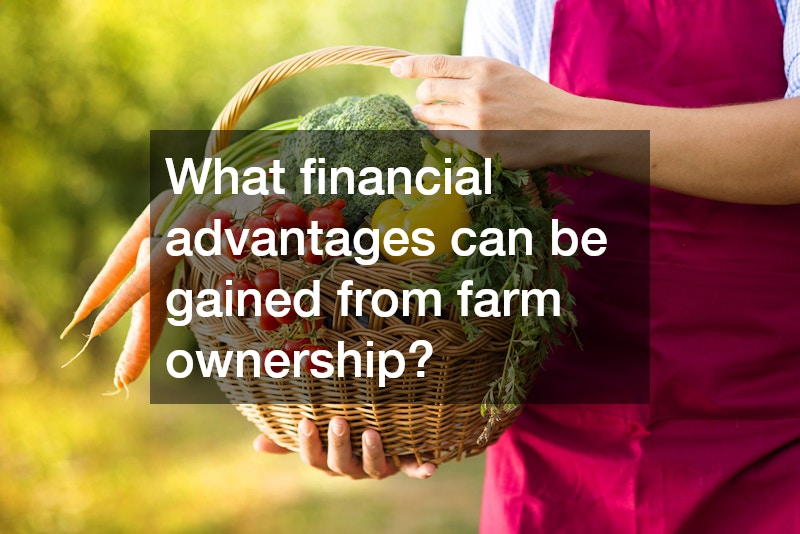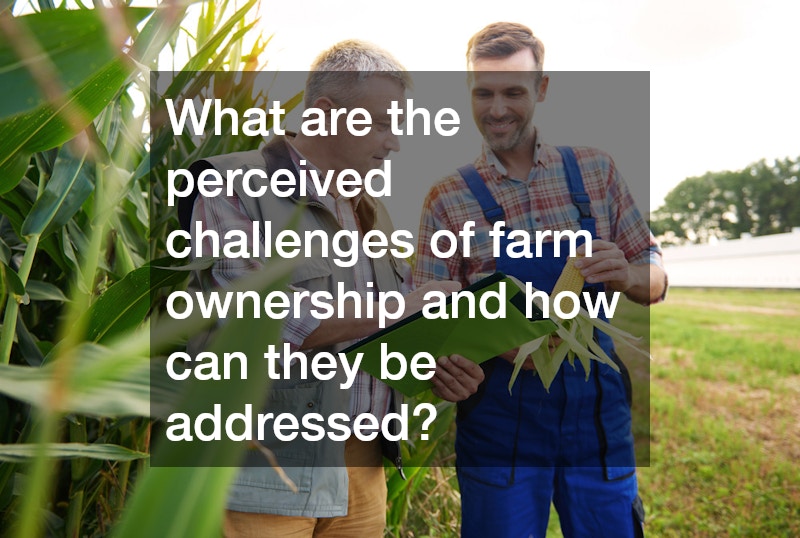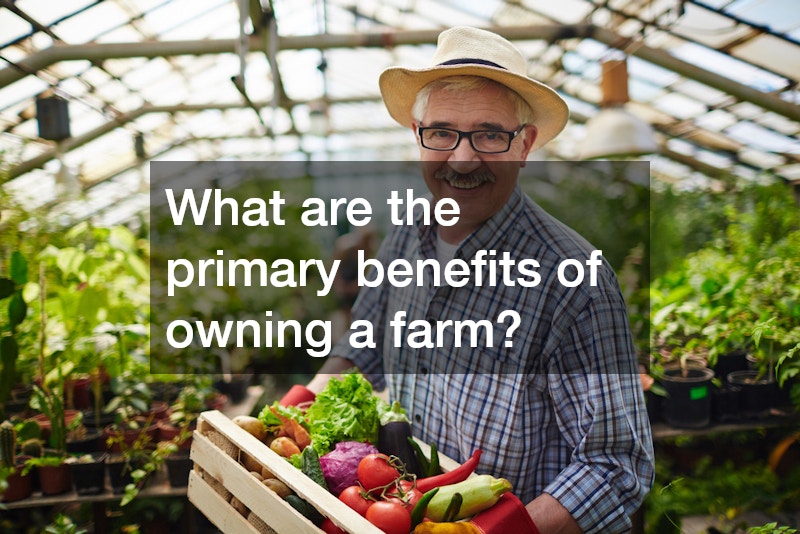Explore the remarkable and far-reaching benefits of owning a farm and discover a comprehensive, step-by-step guide to beginning your own agricultural journey. Whether you’re passionate about sustainability, interested in achieving self-sufficiency, or looking to embark on a new and rewarding business venture, understanding the many benefits of owning a farm is the essential first step toward success. This article will delve deep into the numerous and diverse advantages of owning a farm, from the personal fulfillment of working the land to the financial rewards that come with cultivating crops or raising livestock. Alongside this, we will provide you with practical, actionable advice on how to get started in farming, including tips on finding the right location, selecting the right crops or animals for your goals, and navigating the various challenges that come with farm management. Whether you’re a novice or have some experience, this detailed guide will serve as a valuable resource in your quest to turn your farming dreams into reality.
1. What are the primary benefits of owning a farm?

Owning a farm opens up a range of financial opportunities and potential profitability that conventional careers often lack. Farms can diversify income through various agricultural pursuits such as crop production, livestock, agritourism, and more. By working with partners like commercial concrete contractors, farms can further enhance their facilities to support these ventures.
Farms contribute significantly to sustainable living and positive environmental impact. Implementing eco-friendly practices such as organic farming and utilizing renewable energy sources reduces the carbon footprint. These practices often foster community relationships through shared goals of sustainability, creating a strong local network.
One of the remarkable benefits of owning a farm is the self-sufficiency and independence it provides. This lifestyle enables families to produce their own food, reducing reliance on external sources and ensuring healthier options. With resources like a wooden chicken coop or a custom shed furnished by a custom shed builder, farm owners can optimize their self-sufficient living.
2. How does owning a farm contribute to personal health and well-being?
Access to fresh, organic produce is one of the prominent benefits of owning a farm, promoting better health and nutrition. Farm owners can enjoy meals made with ingredients grown just steps from their homes, ensuring quality and freshness. This direct access to healthy foods is a significant advantage over store-bought options.
Engaging in physical exercise and outdoor activities is another health benefit of owning a farm. Daily chores associated with farming, such as planting, harvesting, and taking care of animals, provide ample opportunities for exercise. Activities like these also promote mental clarity and reduce the monotony often found in indoor occupations.
The mental health benefits from spending time in nature are increasingly recognized. Farm life allows continual exposure to natural surroundings, contributing to stress reduction and relaxation. These aspects of the farm life have been linked to a decrease in anxiety levels, enhancing overall well-being.
3. What financial advantages can be gained from farm ownership?

One of the compelling benefits of owning a farm is the potential for diversified income streams. Beyond crop production, farm owners may explore agritourism or produce specialty goods. For instance, selling farm-fresh products or hosting farm-related events can significantly boost revenue.
Farm ownership comes with a variety of tax benefits and incentives. Governments often support agricultural activities through grants, subsidies, and incentives to encourage local food production and land conservation. These financial advantages can help new farmers manage start-up costs effectively.
Owning a farm is an investment in a long-term asset that can appreciate over time. Properties equipped with infrastructure such as a pole barn, constructed with the help of a deck builder or fence installation services, can see increased value. These investments not only enhance the farm’s operational capacity but also its financial worth.
4. How does farming contribute to environmental conservation?
Farms play a crucial role in promoting biodiversity by creating habitats for various plant and animal species. Practices like crop rotation and maintaining cover crops enrich soil health and encourage a diverse ecosystem. By using sustainable practices, farm owners contribute to the larger goal of environmental conservation.
Soil and water conservation techniques employed on farms help protect these essential resources. Techniques such as contour farming and the establishment of tree belts through services like tree removal ensure the sustainability of these resources. These methods help maintain the ecological balance of the farm environment.
Many farms are turning to renewable energy sources to power their operations, which significantly reduces their carbon footprint. Utilizing solar panels, wind turbines, and other renewable technologies allows for a more sustainable energy use model. These advancements highlight the farm’s role in promoting environmentally friendly practices.
5. How can owning a farm build a sense of community?
Farms become pivotal centers for local food supply and farm-to-table movements. Engaging in markets or developing partnerships with local eateries strengthens community ties as they supply fresh, healthy food options. This fosters a shared community identity centered around support for local agriculture.
Establishing a Community Supported Agriculture (CSA) program is another example of how farm ownership builds community. CSAs allow community members to buy shares of the harvest, providing financial support to farmers while promoting engagement with agricultural processes. This community investment creates a deeper connection between consumers and their food sources.
Hosting educational workshops and events extends the farm’s influence in the community. With venues like those made possible by commercial concrete contractors or deck builder services, farms can host gatherings and educational sessions. These opportunities create spaces where knowledge about sustainable farming can be shared, further embedding the farm in local culture.
6. What are the critical steps to starting a farm?

Conducting thorough market research is essential when starting a farm. Understanding local demand and trends helps in selecting the types of crops or livestock to raise. This research lays the foundation for making informed business decisions regarding farm operations.
Securing land and resources marks another critical step in beginning a farm. Finding suitable land and potentially utilizing services from dirt moving companies and fence installation can prepare the site for immediate use. The allocation of resources, such as acquiring an aluminum enclosed utility trailer from a trailer dealer, maximizes efficiency.
Establishing a comprehensive business plan outlines the strategic path to successful farm operations. This plan will include budgeting, resource allocation, and setting forth operational strategies to guide the farm’s growth. Addressing legal and regulatory requirements is equally crucial, ensuring compliance with local and national laws.
Building a network of reliable suppliers, contractors, and advisors is another key step in the process. Developing relationships with those who provide essential services, such as equipment suppliers, feed distributors, and agricultural consultants, can make a significant difference in the farm’s productivity and efficiency. Having a strong support network allows you to address challenges more effectively and ensures access to valuable resources and expertise as you grow your farm.
7. How does farm ownership foster family bonding and lifestyle advantages?
Farm ownership enables unique opportunities for family collaboration and learning. Families can work together on farms, sharing responsibilities and knowledge, creating an enriching educational setting. This environment fosters a spirit of teamwork and shared success among family members.
Creating traditions and memories is an added benefit of owning a farm. Daily rituals, seasonal festivals, or cooking family meals with homegrown produce become cherished traditions. These memories contribute to a deeper familial bond and a stronger sense of familial identity.
A healthy and balanced work-life dynamic is integral to farm life. Farm ownership encourages a lifestyle that integrates work and leisure, often in natural settings. By living and working closely together, families can find harmony between professional and personal life pursuits.
8. What are the perceived challenges of farm ownership and how can they be addressed?

Managing unpredictable weather and climate change remains one of the significant challenges for farm owners. However, investing in sturdy infrastructure and technology, such as aluminum enclosed utility trailers from a trailer dealer or resources from commercial concrete contractors, can mitigate these risks.
Balancing workload and personal time is another challenge that can affect farmers. Implementing automated systems and working with contractors like those specializing in pole barns can improve farm efficiency. These strategies enable farmers to allocate time more effectively, ensuring a work-life balance.
Ensuring financial stability and growth requires adaptability in farm ownership. By embracing new technologies and market trends, farm owners can navigate financial landscapes more effectively. New farming technologies, discussed in agricultural conferences, offer innovative approaches that can enhance farm profitability.
9. How can technology enhance farming operations and profitability?
Technology is revolutionizing the agriculture industry by significantly improving efficiency, productivity, and profitability. One of the most transformative developments is precision farming, which utilizes tools like GPS technology and drones. These innovations enable farm owners to analyze fields in great detail, monitor crop health, and manage planting and harvesting with unmatched accuracy. As a result, resources such as water, fertilizers, and pesticides are used more efficiently, reducing waste and maximizing yields. This level of precision not only boosts overall productivity but also ensures that farms operate more sustainably.
Automated systems also play a vital role in modernizing farming operations. Technologies such as automated irrigation systems, self-driving tractors, and other machinery reduce reliance on manual labor while significantly increasing efficiency. These systems save time and allow farmers to focus on other critical aspects of their operations. Additionally, the integration of such technology often necessitates the use of specialized structures, which can be designed and constructed by custom shed builders to accommodate new equipment and workflows. These custom solutions provide the infrastructure needed to support modern farming methods effectively.
Another major contribution of technology is its role in data analysis for crop management. Advanced software and sensors collect vast amounts of data on soil conditions, weather patterns, and plant health. Farmers can use this information to make well-informed decisions regarding crop rotations, planting schedules, and nutrient management strategies. These data-driven insights help optimize productivity while minimizing environmental impacts, such as reducing chemical runoff and conserving water. Overall, the combination of precision farming, automation, and data analysis is empowering farmers to achieve greater profitability and sustainability in their operations.
10. How can new farm owners educate themselves on best practices?
Online courses and certifications provide new farm owners with essential knowledge and skills. These educational tools cover a wide range of topics, from sustainable practices to advanced agricultural technologies. Staying informed through these platforms equips owners to run their farms more effectively.
Joining farmers’ organizations connects new farm owners with a community of experienced peers. These organizations often provide resources and support including seminars, workshops, and networking events. Through these connections, farm owners can share their experiences and learn from industry veterans.
Attending agricultural conferences offers insights into the latest trends and innovations in farming. These gatherings are opportunities for farm owners to learn about groundbreaking methods for improving sustainability and productivity. They also serve to inspire farm owners by exposing them to new ideas and technologies.
Owning a farm presents numerous benefits from financial opportunities to promoting a sustainable lifestyle. With careful planning and a commitment to learning, new farm owners can overcome challenges and make a positive impact on their community and environment. Embark on your farming journey today to reap these rewards and contribute to a healthier, more sustainable future.
Understanding the extensive benefits of owning a farm can be transformative both personally and for communities at large. From facilitating community bonds to advancing environmentally sustainable practices, the role of farms extends far beyond simple food production. As more individuals recognize these benefits, the movement toward farming and sustainable agriculture continues to grow.
By securing the right resources and embracing technological advancements, new farm owners can thrive in this rewarding industry. Whether through infrastructure improvements or educational opportunities, the support available today makes beginning and sustaining a farm more attainable than ever. With determination and a clear strategy, farming can become a fulfilling and impactful endeavor.


